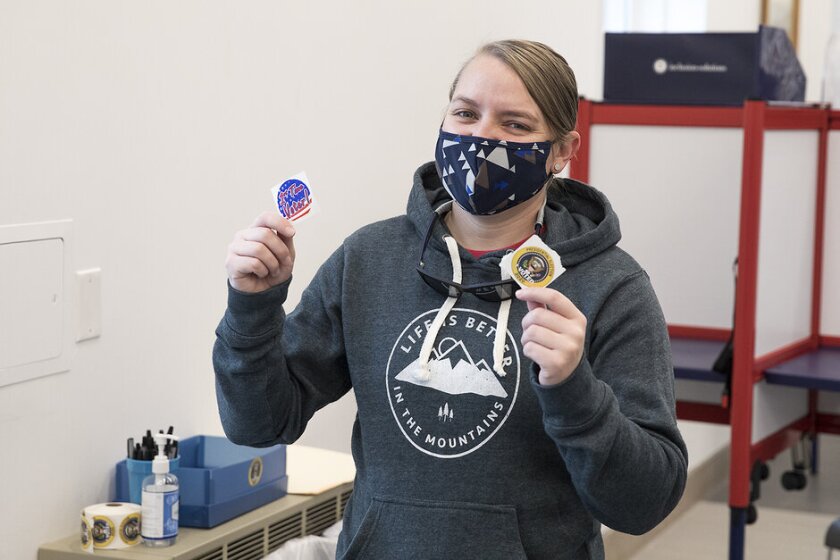Falls Church voters are not alone. Nationwide, more than 90 million Americans had voted by the Saturday before the election, either by mail or in person. Virginia is one of several states that loosened election laws this year, making it easier to vote by mail. Even before COVID-19 upended the election process, five states already conducted their elections solely by mail. Only six others still require an approved excuse to vote absentee.
At a little over two square miles, Falls Church geographically is one of the smallest cities in Virginia. It’s 15,000 residents live less than nine miles west of the White House. Three days prior to the presidential election, Director Bjerke is moving back and forth between his cramped, windowless office and a number of voting stations set up nearby in the lobby of City Hall. A weekly farmer's market is winding down just outside.
Today is the last day of in-person voting before the election. “We're going to have probably more people today than we've had the entire time,” says Bjerke. “But 67 percent of the city has already voted. And that is an incredible amount.”
The added cost and complexity of early voting has presented a new set of problems for Bjerke. Outer mailing envelopes, inner and outer return envelopes and the accompanying instructions had to be redesigned to conform with the new standards. “We ended up spending almost $10,000 on the envelopes,” says Bjerke.
The Falls Church return envelopes are color-coded to help the post office distinguish them from the return envelopes of neighboring Fairfax and Arlington counties. Still, ballots from other jurisdictions find their way into the Falls Church City drop box, deposited there by confused voters. It is Bjerke’s job to see that the wayward ballots get to their intended location, a job made a little easier because of family ties. “My father works for Fairfax County elections,” he says. “So, it's been pretty easy for me to give my ballots to him. There's a good chain of custody there.”
Even when a ballot makes it to the right place, it is sometimes rejected because the voter forgot to sign or other routine errors. This year though, there is a remedy for these ballots through a “curing” process. “If there's something that would in most years cause us to reject that ballot, we now have a law that says we have to contact the voter and give them time to come cure it,” says Bjerke. “We've had a couple dozen get cured. But really, considering how many we've mailed out, it's not many.” Today, there are still a handful of uncured ballots in a box by Bjerke’s desk, waiting for a remedy.

Bjerke explains to a voter from another jurisdiction that he has come to the wrong polling place.
The thousands of ballots already received by Bjerke’s office cannot yet be counted, but they have been opened and scanned, which will expedite tallying on Tuesday. “Because we're having such a large volume of by-mail ballots, we also want to make sure we have election night results,” he says. “We want people to be confident in their by-mail ballots.”
The city uses a Republican election officer and a Democratic election officer to look at each envelope and match it to the poll book. If the name, the address and the signature is good, they can then open it, take the ballot out, still folded, and put it in a bin that's going to be scanned, according to Bjerke. “We've been doing it every Wednesday,” he says. This pre-processing will expedite tallying on Tuesday.
Even though the majority of votes will have been cast by Nov. 3, there is still work to be done that day fielding calls. For example, instead of looking up their polling location on the Virginia Department of Elections website, many voters will simply search online and end up at the wrong place.
“The election officers will then give me a call and we will look up their information to see where they should be voting. So that's a large part of the day,” Bjerke says. “Just looking up registrations.” As has happened elsewhere around the country, worries about a dearth of election officers resulted in a flood of people stepping forward. “We have been turning away election officers for a month now.”
Bjerke is confident that this election is under control. He’s more concerned about the future. “I think watching the general assembly the next couple of years is going to be very interesting, how they loosen the laws on elections. It's going to be a lot of changes,” he says. “It’s going to be a lot of expense.” Funding from the Coronavirus Aid, Relief, and Economic Security (CARES) Act offset some of the costs for this election, but next year’s race for Virginia governor is sure to burden an already strained system. “With all this early voting, how is that going to look? Where's the budget? Where's the money going to come from?”

A Falls Church voter celebrates after casting her very first ballot.
Out in the lobby of City Hall, a 34-year-old Falls Church citizen has just cast her first vote ever and is posing for pictures, clutching a voting sticker in each hand. “It’s become very clear that my vote does matter,” she says. “I’m excited. It was super easy. It was awesome!”









